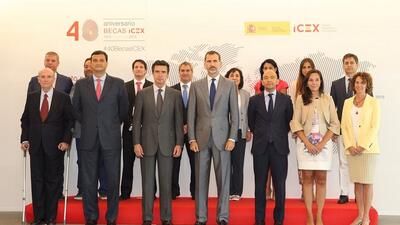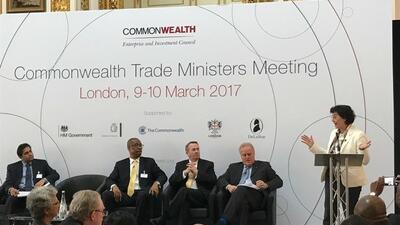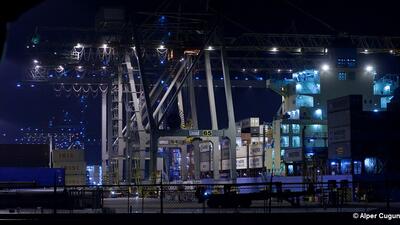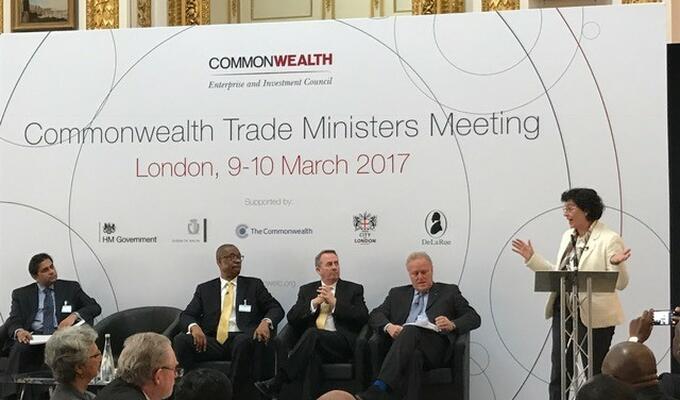
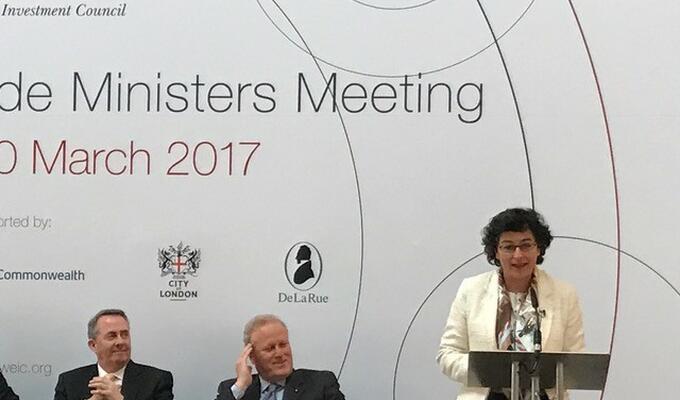
Address to Commonwealth Trade Ministers Meeting
Lord Marland, Chairman, Commonwealth Enterprise and Investment Council
Hon Dr Okechukwu Enelamah, Minister of Industry, Trade and Investment, Nigeria
Rt Hon Dr Liam Fox MP, Secretary of State for International Trade, UK
Mr Shanker Singham, Director, Economic Policy and Prosperity Studies, Legatum Institute
Honorable Ministers, Ladies and Gentlemen, Friends
It is an honor to address this first meeting of trade ministers from across the Commonwealth. Thank you for inviting the International Trade Centre to be part of these discussions.
The last time trade topped the agenda of a Commonwealth conference was back in the 1930s. So long ago that it wasn’t yet called the Commonwealth. Nevertheless, it is the memory of that dark decade that haunts us today. A decade marred by protectionism and a breakdown in international economic cooperation. A decade that began in depression and ended in war.
The post-1945 economic order was built by leaders who were scarred by this experience, which convinced them that “if goods do not cross borders, soldiers will.” The multilateral trading system and its core principle of non-discrimination have served us well.
The open global economy has helped lift over a billion people out of extreme poverty. Predictable and open markets have made it possible for developing countries to achieve high rates of catch-up growth by hitching their wagon to the global economy. From Barbados to Mauritius to Sri Lanka, countries have used trade to shift people and resources out of subsistence agriculture and services and into higher-value-added work. Importing what the world knows, and exporting what it wants, has been the most effective path to relative prosperity.
Amidst today’s humanitarian crises and turbulent politics, it is easy to lose sight of the enormous progress we have made. Most of us in this room can remember when extreme poverty was thought to be a scourge that would always be with us. Today, the United Nations Sustainable Development Goals can realistically target its eradication over the next thirteen years. Never have we, as a people, been more literate. Never have children had a better chance of seeing their fifth birthday.
I do not mean to pretend that all countries and all communities have shared fully in this progress. Many have not; I’ll come back to this later. But for now I will just say that the gains have been real. And yet, the economic order that has underpinned this rising prosperity is under threat.
In a turn of events few would have foreseen at the turn of the century, the backlash against globalization is coming from advanced economies. If we look closer, however, this may not be as surprising as it sounds. While trade has been good for developed economies too, the benefits from it have not been equally shared. Income and wealth inequality have grown. Too many people have gone a generation without seeing a real wage increase. Failure to invest adequately in solid domestic policies to share the benefits of globalization have led to waning support for open markets.
A less open global economy would reduce prospects for the poorest countries to trade their way out of poverty. Even for the very richest countries, turning inward would diminish the productivity gains that result from specialization, while inviting trading partners to retaliate with protectionism of their own. The result would make it harder, not easier to generate the rising incomes that angry electorates want.
Commonwealth members have an opportunity – a responsibility, even – to lead the way in keeping markets open. I can think of three broad ways to do this:
• One, advocate for open markets and use your convening power to foster honest political conversations about trade. A fact-based trade debate would acknowledge that technology and automation create jobs but also destroy far more jobs than imports or outsourcing. In the USA the ratio is 8 out of 10 jobs lost. A fact-based trade debate would emphasize that value addition is what matters, not crude bilateral trade balances. A fact based debate would focus less on gross trade figures and more in measuring trade in value added. A fact-based trade debate would recognize that in a world of multi-country value chains, protectionism undermines export competitiveness, and cooperating on non-tariff measures is necessary to reduce trade frictions.
• But another fact about trade is that some people are better equipped than others to benefit from it. And this brings me to point two: individual governments can shape domestic policies to ensure that citizens are empowered to adjust to, and benefit from, rapidly changing labour markets. Many of you have already placed inclusive growth at the top of your domestic agendas.
• And three, in terms of trade policy measures, there is considerable scope for Commonwealth members to act to expand global trade, even in today’s political climate.
Take, for example, the WTO Trade Facilitation Agreement, which entered into force two weeks ago. The countries represented here can show leadership and reap economic gains by moving swiftly to implement the agreement’s measures to cut red tape and border delays. For some of these measures, many developing countries will require technical and financial assistance, and the TFA promises them such aid. The Commonwealth can work to ensure that the international community comes forward with the support needed to translate the promise of the new WTO agreement into real increases in trade. Not because it feels good to be charitable. But because reducing the costs of trade is what will help 90% of your businesses – SMEs – to trade across borders.
New bilateral, regional and plurilateral trade agreements could help Commonwealth members consolidate and deepen commercial ties. One priority here should be preserving developing and least developed countries’ access to the British market in light of the United Kingdom’s intention to depart from the EU customs union as well as to ensure the departure is as little disruptive as possible of intra-Commonwealth trade flows. Intelligent rules of origin could help prevent the disruption of established supply relationships.
But while negotiating new trade arrangements is well and good, the fact is that businesses often struggle to make use of market-opening that exists on paper. Meeting a key environmental or health standard can be prohibitively expensive. Obtaining proof of origin certifications may be unnecessarily complicated. Non-tariff measures are compounded by supply-side weakness. Especially in developing countries, companies might simply lack information about export market opportunities and requirements.
At ITC, we work to bridge this gap between trade rules and trade flows, between making trade possible and making trade happen.
One example of what I mean by this comes from the East African Community. The bloc, which includes Kenya, Rwanda, Uganda, and Tanzania, has committed to developing a customs union and common market. ITC has been working with governments and the private sector to identify and solve the problems, such as a scarcity of work visas that companies run into when they try to do business across borders within the region.
The Commonwealth could use its convening power to facilitate dialogue and international consensus on supply-side action to lower trade costs and help businesses in small, fragile, and poor states become more competitive and connect to markets around the world. Commonwealth members are better placed than most to appreciate the significance of invisible barriers to trade: thanks to a common language, similar legal systems, and networked diaspora groups, bilateral trade costs between Commonwealth members are 19% lower than those for other country pairs. In spite of this ‘Commonwealth effect’, however, a Secretariat report from 2015 determined that there was unrealized potential to boost intra-Commonwealth trade by over one-third – worth some $156 billion.
These are gains worth realizing. In doing so, I would urge you to make small and medium-sized enterprises an important part of any Commonwealth-led ‘agenda for growth’. Their success directly contributes to inclusive growth and development. SMEs account for close to 70% of jobs and the overwhelming majority of companies just about everywhere. But, especially in developing countries, they tend to be much less productive than their larger counterparts, translating to low wages for large sections of the workforce. So when SMEs are equipped to become more competitive and tap into international value chains, it’s a recipe for growth that benefits people lower down on the economic pyramid.
Another investment in inclusivity comes from empowering women to be equal participants in the economy and in trade. Greater equality and economic opportunities for women makes for healthier, more educated families, better managed businesses, and richer, more competitive national economies. ITC stands ready to be your partner in making trade happen. We already have projects operating in many of your countries and regions.
In the Caribbean, we are working to bolster productivity, value addition, and exports in the coconut sector, so that farmers and processors can gain from skyrocketing global demand for coconut products. In the Pacific, ITC is helping to promote climate-smart agriculture in Fiji, and higher incomes for the women who weave bilum bags in Papua New Guinea. We are partnering with the UK Department for International Development on ‘triangular’ initiatives to draw investment from India and China into export-oriented sectors in East Africa. And our SheTrades initiative is expanding opportunities for women entrepreneurs around the world.
Before closing, let me once again thank the Commonwealth Enterprise and Investment Council (CWEIC) and the Commonwealth Secretariat for organizing this Ministers’ meeting – and for ensuring that business is well-represented here alongside governments. ITC looks forward to working with you to boost trade capacity and competitiveness, to achieve inclusive and sustainable growth.
Thank You






